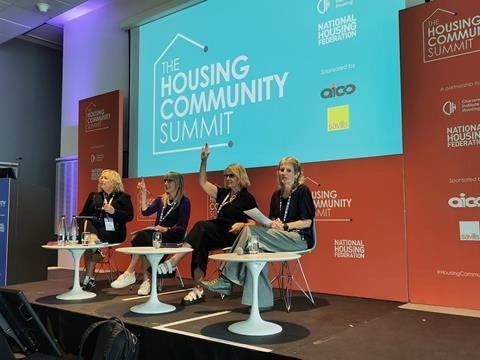Fiona MacGregor urges social landlords at the Housing Community Summit to reflect on the way they listen to residents
The Grenfell Tower Inquiry’s final report shows social landlords need to think “very carefully” about their relationships with tenants, the chief executive of the Regulator of Social Housing (RSH) has said.

Macgregor, speaking at the Housing Community Summit in Liverpool earlier today, said that even if a tenant has a “difficult style” providers need to “separate out style and substance “ and “think about what they’re trying to tell you.”
MacGregor urged all social landlords to read the report, and in their thinking “go beyond” just the Tenant Management Organisation (TMO) section and the 58 recommendations in the inquiry’s phase two report.
The final report from the inquiry, published on Wednesday last week, noted that the Kensington and Chelsea Tenant Management Organisation (KCTMO) poorly handled its relationship with “vocal” residents such as Ed Daffarn, who they viewed as a “militant troublemaker”.
MacGregor said: “Ed is a very forthright individual, that does not undermine the substance of the points he was trying to make about fire safety.”
The chief executive at the regulator also said the report is a reminder of landlords’ responsibilities “if you’ve got managing agents and you don’t know what they’re doing and if you’re in that case you’re London Borough of Kensington and Chelsea, you should have done.”
MacGregor said that due to the new proactive inspection regime, which was introduced as a “direct consequence” of the Grenfell Tower fire, the inquiry felt no new changes to the act or further recommendations for social landlords were needed.
She said it was “interesting” that no formal changes were introduced, and that with the combination of the Social Housing (Regulation) Act, engagement with tenants and stronger focus on safety, the inquiry seemed to think “all the key ingredients are there”.
She added that this places the “burden of responsibility” on the regulator and social housing providers.
The report also highlights the importance of data, MacGregor said.
She said that as well as landlords knowing their stock well, they should know who is in their homes and what their needs are, as far as they can and adapt accordingly.
“My starting point coming away from reading the report was we’re not the construction industry, we’re not the manufacturers of the cladding and we didn’t lie,” she stated. However, MacGregor went on to say “frankly in the end it doesn’t matter if it’s down to incompetence, it’s the outcomes that matter”.
She said that regulation only goes so far, and that it’s about RPs’ culture and professional curiosity.
On the consumer standards inspections so far, MacGregor said that most housing associations are in the ‘V2’ category for financial viability, and the regulator expects that to continue.
She said that following the consumer standards inspections, there has been an even split between C1, C2 and C3 grades, and that C3 grades are “coming out a bit more from responsive engagement” as the RSH looks into referrals made to them.
She added that where housing providers have received a non-compliant C3 or C4, meeting health and safety outcomes may “still [be] a gap”. For example, housing providers may either have large volumes of work outstanding or not really know what still needs to be done.
More from the Housing Community Summit
>> ‘We need subsidy’ Liverpool HA boss tells Community Housing Summit as homelessness costs soar
>> New public-private alliance for zero-bills MMC homes launched in Liverpool
>> Last government’s retrofit programmes to stay as minister says no time for ‘hiatus’
MacGregor described tenant engagement as a “reasonably mixed picture”, noting that “some pretty valiant efforts are being made”.
However, she noted “there is difference between talking to or at tenants and hearing back and listening”.
Ceri Victory-Rowe, director at Campbell Tickell, who specialises in governance and regulation, said the regulatory changes have “widely been welcomed” by the sector.
She said that engaging with tenants “should be simple” but that organisations are starting from different places on this, and, in reality, many organisations are finding it difficult.
However, she stated that she has seen “real momentum behind culture change” both as RPs prepared for the introduction of the new regulatory regime, and since they were introduced in April.
Victory-Rowe said she hears this from customers, who say they feel “more heard and more important in the eyes of the organisation”.
She said she also hears it from frontline staff, who feel the consumer standards have shone a spotlight on the importance of what they do.
The Grenfell Inquiry made 59 recommendations, including the setting up of a new construction regulator, health and safety strategies for higher-risk buildings, a new regulator for fire engineers, a product tests library and mandatory qualifications for fire risk assessors.











No comments yet